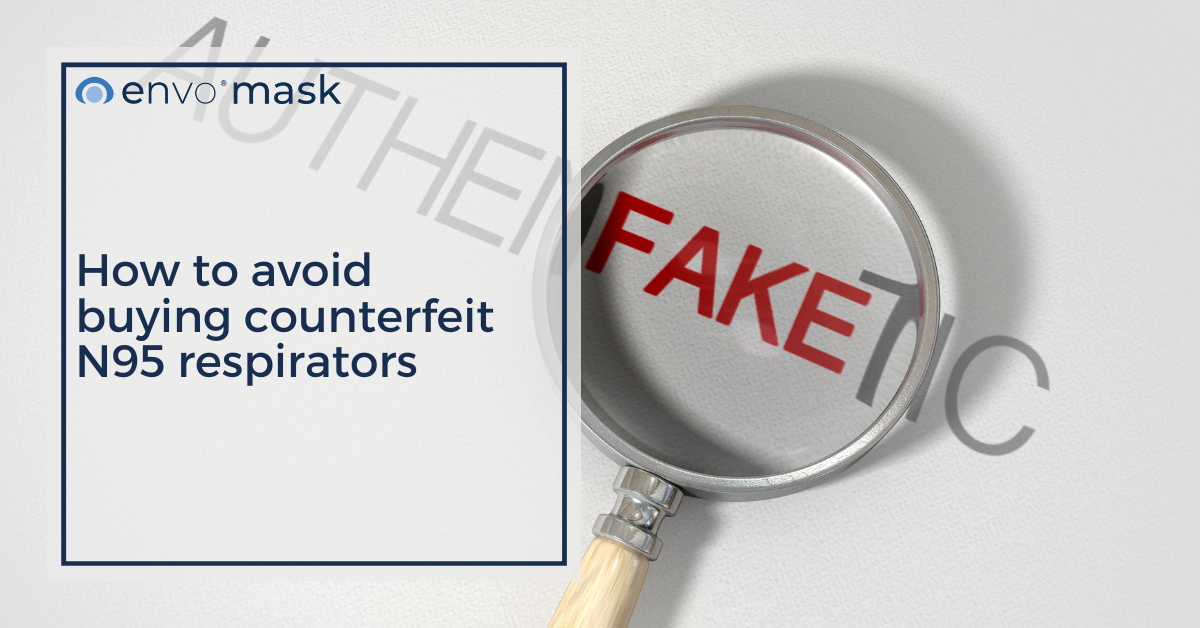As a result of the global public health crisis and the development of new COVID-19 variants, N95 respirators have become somewhat ubiquitous in the United States. The widespread availability of N95 respirators, often mistakenly referred to as N95 masks, makes it possible for the general public to purchase them directly on manufacturers’ websites or place orders through online retailers with a few clicks. However, the prevalence of this type of personal protective equipment (PPE) does not necessarily equate to their legitimacy.
As you take action to keep yourself, your loved ones, and your workforce protected from the virus, the time is now to learn more about how to navigate the process of purchasing authentic N95 respirators and recognize the characteristics of fake products. Read on for considerations to keep top-of-mind to help you avoid buying counterfeit N95 masks.
Legitimate N95 respirators are approved by the National Institute for Occupational Safety and Health (NIOSH). According to the Centers for Disease Control and Prevention (CDC), “…NIOSH is the federal agency responsible for testing and approving respirators used in U.S. workplace settings…NIOSH only approves respirators that pass its strict quality assurance and performance requirements. As part of these tests, NIOSH uses a near worst-case penetrating aerosol size (i.e., particles that are best able to make it through a filter), and an N95 respirator must not allow more than 5% of these particles to penetrate through.”
NIOSH maintains a Certified Equipment List (CEL) that you can use to verify whether an N95 respirator has earned an approval designation by this sister agency to the CDC. When you arrive at the CEL, simply input the testing and certification (TC) approval number of your N95 mask into the database to verify whether it is NIOSH-approved. The Respiratory Protection Information Trusted Source is another resource provided by NIOSH that you can use to help avoid buying counterfeit N95 respirators.
According to the CDC, if an N95 mask is NIOSH-approved, then it also contains the below details located on the facepiece:
- “Name of approval holder/manufacturer business name • Part number (which may be the model number, but looking for the part number, even on FFRs, is the most accurate way to identify a particular respirator)
- NIOSH filter series and filter efficiency level, which will be N95 (for other FFR types, it could be N99, N100, R95, R99, R100, P95, P99, or P100) • NIOSH Testing and Certification approval number, e.g., TC-84A-XXXX
- NIOSH in capital block letters
- Lot number may be on the N95 abbreviated label or the product packaging”
Resources on the CDC’s Counterfeit Respirators / Misrepresentation of NIOSH Approval webpage can help you distinguish an authentic N95 respirator complete with the necessary labeling information from a counterfeit one. When browsing products belonging to this category of filtering facepiece respirators (FFRs), ask yourself the following questions to keep tell-tale signs of fake N95 masks at the forefront:
How is NIOSH spelled? If the spelling of NIOSH is incorrect on either the facepiece or the packaging of an N95 respirator, then it may be a fraudulent product.
What parts of your face does the N95 respirator cover? A legitimate N95 mask should provide full coverage over your mouth and nose and offer a tight-fitting face seal.
Is your mask marketed to youth? If so, it’s a red flag because there are no N95 respirators with NIOSH approval for children.
Does your N95 mask have decorations on it? Sequins and other types of decorations on your N95 respirator indicate that the product may be fraudulent.
Distributed by Clear Air, LLC, the NIOSH-certified envo mask offers comfort and peace of mind to individuals like you who want to protect their health. If you’re looking to invest in quality, NIOSH-approved N95 respirators that offer safety and value, then look no further than the envo mask store.
